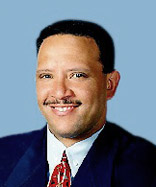 Click here to watch the live webcast of the National Urban League's Annual State of Black America Town Hall Meeting, free site registration required
Click here to watch the live webcast of the National Urban League's Annual State of Black America Town Hall Meeting, free site registration required
Next Thursday, I invite you to join the debate about the number one issue facing the nation – the deep and persistent jobs crisis that has been especially devastating in urban communities of color. As part of the National Urban League's annual Legislative Policy Conference in Washington, D.C., we will convene a free State of Black America town hall meeting on March 31, from 10 a.m. to noon at Howard University's Cramton Auditorium.
A panel of notable policy experts, scholars, and journalists will lead a public dialogue about ways to end the jobs crisis in our communities. But, the most important voices invited to this meeting belong to you – the student struggling to pay college tuition, the father who lost his job six months ago and is wondering if he will ever be able to support his family again, the single mother having to choose between child care and health care for her kids.
The great recession has seen a loss of more than eight million jobs. Many of those jobs are in declining industries and may never return. According to a recent CNN Money news report, "Home building lost nearly 1 million jobs since the start of 2008, while the auto industry shed 300,000 manufacturing jobs due to plant closings. The finance and real estate sectors lost more than 500,000 jobs." Unfortunately, many of those lost jobs are never coming back.
That is why the discussion about bringing jobs back to urban America must focus on ensuring that people in our communities are educated, trained, and have access to the jobs of the future. The Bureau of Labor Statistics projects that between 2008 and 2018, the industries projected to produce the largest number of new jobs are health care and social assistance, and professional and business services.
Nearly half of all new jobs created during those years will require some type of post-secondary education
Because of high dropout rates and low college graduation rates in communities of color, it is projected that 70 percent of prime working age African American adults and 80 percent of Hispanics will lack the requisite education for almost 40 percent of projected new jobs.
Clearly, immediate action is needed to turn this picture around. The National Urban League's 12-point Blueprint for Quality Job Creation offers several powerful remedies, including a plan to boost minority participation in emerging Broadband and Green Industries. We also call on Congress to reform, revise, and reauthorize the Workforce Investment Act to focus on preparing and retraining workers for 21st century jobs by targeting young adults with less than college education as well as high school dropouts and older workers whose jobs were eliminated by the recession. We must also do more to reverse troubling recent trends in minority high school dropout and college enrollment rates.
These are just some of the ideas that will be discussed at the March 31 town hall meeting. We need your input too. If you can't attend in person, the event will be webcast live at www.TheSkanner.com beginning at 10 a.m. Eastern Time. You can also join the conversation on
Twitter@NatUrbanLeague using #SOBA11 or on Facebook.
Marc H. Morial is the President and CEO of the National Urban League.
- Home
- News
- Opinion
- Entertainment
- Classified
- About Us
 MLK Breakfast
MLK Breakfast- Community
- Foundation
- Obituaries
- Donate
11-19-2024 7:55 pm • PDX and SEA Weather














































































































































































































































































































